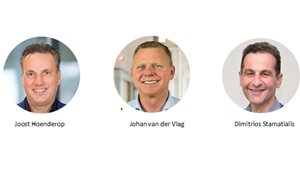 My name is is Jojanneke Huck and my nationality is Dutch. I am a lecturer at the department of Physiology, theme Renal disorders.
My name is is Jojanneke Huck and my nationality is Dutch. I am a lecturer at the department of Physiology, theme Renal disorders.
When you were a kid what did you want to be when you grew up? Can you tell us something about your child years.
I grew up in a village in the south of the Netherlands, in Limburg (and yes, I still speak in dialect to some people). I have an older brother and sister, twins, and while they have followed my father’s footsteps into chemistry, I wanted to become a veterinary doctor. You could find me outdoors most of the times, or behind a book. I always wanted to know how things worked.
What was your previous academic training, where did you study and why that study?
I didn’t get into veterinary medicine in the first year and started studying biology in Utrecht. And although I did start veterinary medicine in the second year, I discovered after a year that I was more interested into the mechanisms of diseases and wanted to do research. That why I got my degree in biology and did my PhD in medicine in Amsterdam. I continued as a neuroscientist performing research in Oxford, Heidelberg and Berlin, before returning to the Netherlands and now focussing on education.
The RIMLS motto is: ‘Today’s molecules for tomorrow’s medicine’. What does this mean for you?
To enable any translational research, one has to facilitate fundamental research. It is great to work in an environment where you can see progress being made in both molecular and clinical research. Education is a great way of preparing students to become tomorrow’s researcher or physician, with knowledge of both molecules and medicine.
Who is your great example as scientists? And please give a motivation why.
That would be Prof. dr. Peter Somogyi, I have had the honour of working in his lab in Oxford as a postdoc. He is an outstanding scientist and pioneer in mapping the functional organisation of the cerebral cortex. Not only does Peter have and incredible mind, his curiosity, explorative energy and enthusiasm over newly made scientific progress, is a driving force for anyone working with him. And apart from being a great scientist, he is a very kind and humble man, always willing to teach you what he has learned.
Which research discovery that you have made has made you most proud?
Already many years ago, when I was a PhD candidate, I performed research on inherited metabolic disorders in children presented with brain abnormalities and discovered a new enzyme deficiency in the polyol metabolism.
Given unlimited finance what experiment would you perform?
Since my focus is on education, I would set up a national physiology education platform, where we would develop and share innovative teaching models, like animations and computer programs, to teach students, teachers and specialists on complex and abstract physiology concepts.
What does your working area (desk, office) look like and what does it say about you (or your research)?
My desk looks relatively clean. There are some stacks of paperwork and sometimes lots of yellow notes, but it is more organized than I am at home. This resembles my approach in organizing education. I have learned how to structure a course and keeping an overview, without being too rigid.
Nominate a colleague to be in the spotlight and what would you like to ask him or her?
I would like to nominate Annemarie Boleij and would like to ask her if there should be given more attention to the microbiome in studying diseases.
What type of person are you, quick insights:
a) Mac or PC? : Used to be PC forever, but I’m a changed girl..b) Theater or cinema? : Cinema
c) Dine out or dine in? : Both, I love cooking and enjoy dining out
d) Ferrari or Fiat? : Ferrari
e) Shopaholic or chocoholic? : Neither, I prefer cheese
f) Culture or Nature : A balanced mix of both
Related news items

Grants for heart and kidney research Two awards to Radboudumc in Open Competition ENW-XS
21 July 2022Two researchers from the Radboudumc receive a grant from the NWO within the Open Competition of the Exact and Natural Sciences. They are Thijs Eijsvogels, who studies the heart, and Pieter Leermakers, who studies the kidneys.
go to page
ERC Starting Grant awarded to Jeroen de Baaij
17 March 2022 Jeroen de Baaij, kidney researcher the Radboudumc, receives an ERC Starting Grant worth 1.5 million euros. He will use this grant to improve the diagnosis and treatment of severe magnesium deficiencies, which can lead to epileptic seizures and muscle cramps. go to page
Academic collaboration agreement between UTwente and Radboudumc
23 November 2021 The group of Biomaterials Science and Technology (BST) of the Faculty of Science and Technology at the TechMed centre of University of Twente has signed a formal academic collaboration agreement with the departments of Nephrology and Physiology at Radboudumc. go to page
Senior Kolff Fellowship for Jeroen de Baaij
29 July 2021 Jeroen de Baaij, theme Renal disorders, received a prestigious Senior Kolff grant from the Dutch Kidney Foundation. His project aims to establish dietary approaches against vascular calcification in chronic kidney disease. go to page
Magnesium deficiency increases the risk of cardiovascular disease in diabetic patients
21 June 2021 Publication in Diabetes Care. go to page
Lisanne Gommers nominated for James Lind Prize Your vote is needed
25 May 2021Her PhD research entitled "Digesting the role of the gut microbiome in proton pump inhibitor (PPI)-induced hypomagnesemia'' has been nominated for the James Lind Prize. You can vote now until 8 June.
go to page